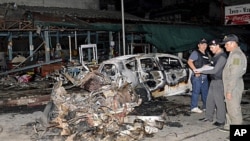Coordinated bomb blasts in Thailand's southern provinces have left at least four people dead including a child, and at least 60 people injured marking another act of violence in Thailand's long simmering insurgency. Analysts fear the insurgency is using more sophisticated explosive devices in their attacks and there are calls on the new government of Prime Minister Yingluck Shinawatra to promote greater coordination between security forces and civil authorities to curb the violence. There are reports that drug dealers were involved in the latest violence.
The bomb blasts in the early evening Friday in the southern province of Narathiwat went off in a coordinated series of explosions just as local residents and tourists were preparing for the evening.
The blasts occurred in a tourist hotel area of border town Sungai Kolok in Narathiwat - one of three southern provinces that include Pattani and Yala that border with Malaysia and have majority Muslim populations. Police say the bombs were concealed in a car and two motorcycles. The series of attacks were among the most severe since the government of Prime Minister Yingluck Shinawatra was installed in August.
Thailand’s southern provinces have been wracked by an insurgency that escalated in 2004 and has now taken the lives of over 4,000 people, largely civilians from both ethnic Thai Buddhist and Malay Muslim communities.
Benjamin Zawacki, a representative from Amnesty International, says the insurgency appears to be strengthening over time and undermining security despite counterinsurgency efforts in the southern provinces.
“One can’t say it’s getting any better," he said. "The longer it goes on just by virtue of the fact that it continues one could say it’s simply getting worse because policies are tried, policies fail and the fact that it’s now in its eighth year and nearly two persons are killed on average per day over the course of the past seven and a half years indicates it’s an extremely intensive insurgency and counterinsurgency in the deep south.”
Zawacki says the attacks recently have increased in explosive power and sophistication.
Thai intelligence reports say the insurgents are now using plastic explosives smuggled into Thailand. Explosive devices are larger and regularly of 10 to 15 kilograms.
Chidchanoke Rahimulla, a lecturer at the Prince of Songkla University in Pattani, Thailand said police believe the latest attacks followed recent arrests by authorities against drug gangs linked to the insurgency. Trafficking in narcotics is a key source of financing insurgent activities.
Chidchanoke says authorities need to separate security policies to deal with drug trafficking and the insurgency.
“If you want to clean up the drug traders you must have the intention to do it and on a continuous [basis] and for the emergency we need another way to solve the problem too not use the same policy. Now the policy to solve the problem is like an umbrella and covers all the problems inside,” said Chidchanoke.
The southern border provinces remain under a state of emergency that enables the military and security to have wide powers. The previous Thai government of Prime Minister Abhisit Vejjajiva had faced resistance from the military over moves to increase civilian influence in the southern provinces.
Following the latest attacks, Prime Minister Yingluck Shinawatra ordered a senior deputy police chief to the south to improve security. Yingluck’s older brother, Thaksin Shinawatra, who was prime minister until 2006, has been accused by rights groups of the use of excessive force in dealing with the insurgency.
But efforts by successive governments, including Abhisit's, to promote reconciliation have fallen short in ending the bloodshed that includes drive by shooting, beheadings and the burning of victims in a bid to terrorise local communities. Security forces have been accused of extrajudicial killings.
While Thailand is 95 percent Buddhist, the three provinces near the Malaysian border are largely Muslim.
Violence in Southern Thailand Claims 4 Lives




